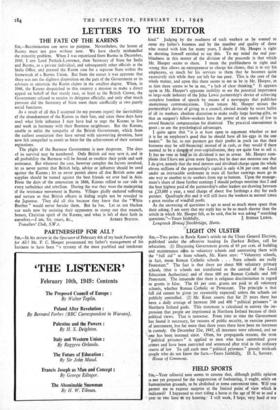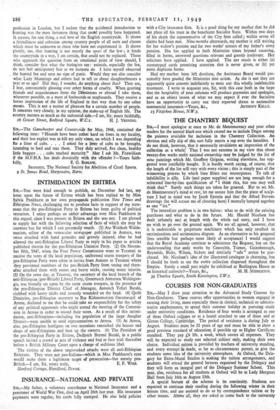FIELD SPORTS
Sta,—Your editorial note seems to assume that, although public opinion is not yet prepared for the suppression of foxhunting, it ought, solely on humanitarian grounds, to be abolished at some convenient time. Will you permit me to express surprise at the limited point of view which is indicated? I happened to start riding a horse at the age of 50 or so and a year or two later t6 try hunting. I still work, I hope, very hard at my profession in London, but I reckon that the accidental introduction to hunting was the most fortunate thing that could possibly have happened. It creates, for one thing, a real love of the English countryside. It shows a friendliness and cohesion among country people of all sorts and classes which must be unknown to those who have not experienced it. It shows plainly, too, that hunting is not merely the sport of the few ; it binds the countryside in a way, I am certain, that could not be replaced. Those who approach the question from an emotional point of view should, I think, consider first what the biologists say: animals, especially the fox, do not feel anticipatory fear as we humans do I have myself observed the hunted fox and seen no sign of panic. Would they not also consider what Lady Munnings and others had to tell us about slaughterhouses a year or so ago? Did they, I wonder, do anything about that? They are, I fear, conveniently glossing over other forms of cruelty. When greeting friends and acquaintances from the Dominions or abroad I take them, whenever possible, to a meet of foxhounds or staghounds. They receive a better impression of the life of England in that way than by any other means. This is not a matter of pleasure for a certain number of people. It concerns very closely, in my opinion, the make-up of English life. The country matters as much as the industrial side.—I am, Sir, yours faithfully,
16 Gower Street, Bedford Square, W.C.r. H. J. VENNING.







































 Previous page
Previous page